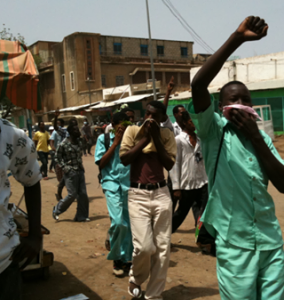Fuel stations are guarded by police forces, schools have been closed in many cities, internet was shut down, and an unconfirmed number of people have been killed during the third day of protests taking place in several parts of Sudan, sources affirm to Radio Dabanga.
In the early afternoon eyewitnesses explained that the police pulled back from several roadblocks in Omdurman after they fired teargas and live bullets. Several fuel stations were burned down, while the police tried to protect the remaining petrol stations against attacks.
During an earlier demonstration last week in Nyala, at least five demonstrators were killed after a popular businessman was killed by gunmen. Rallies started again on Monday after President Omar Al Bashir announced he was lifting petrol subsidies leading to rising prices of fuel and commodities in Sudan.
An estimated 300 people on Monday took part in a demonstration in Wad Madani, a university town in Al Gezira state. The protesters were faced with violent response by the police. During the clashes the protesters burned the local office of the ruling National Congress Party of president Bashir.
According to witnesses, several people were killed, but no independent confirmation about the number and names of the victims was received by Radio Dabanga. While president Omar Al Bashir was planning a trip to the US for a United Nations meeting, the police in Kassala in East Sudan, and also in the northern city of Atbara and elsewhere in the country had to start fighting larger demonstrations.
On Wednesday, the police in the capital Khartoum stopped a demonstration with over 1,000 people in the nearby town of Omdurman. The police set up several roadblocks but had to withdraw after its forces apparently ran out of bullets and tear gas. In Bahri, Khartoum North, the police was trying to chase a couple of hundred protesters.
Internet blackout
Renesys Corporation, an Internet Intelligence Authority, confirmed on Wednesday afternoon that “Sudan has cut itself off from global Internet at 12:47UTC amid riots in Khartoum.” The website of Sudan News Agency (SUNA) and websites of the Sudanese police and government, for example, cannot be reached.
Radio Dabanga’s shortwave transmission into Sudan was blocked and the government tried to interrupt the signal, according to listeners.
Yasir Arman, Secretary General of the rebel movement Sudan People’s Liberation Movement-North (SPLM-N), announced in a press statement on Wednesday that “Sudanese security forces are using live bullets and excessive force against peaceful demonstrators”. He stated that more than ten people were killed as a result, hundreds were arrested, many of which were also tortured.
Arman says that most of the killed demonstrators come from Wad Madani in Gezira, noting that Khartoum, Atbara, Kosti, and many other towns “are witnessing peaceful demonstrations against the austerity measures by the Bashir government.” The Secretary General re-emphasized that Sudan Revolutionary Front (SRF) rebel coalition and the SPLM-N support the peaceful uprising in Sudan.
In June 2012 the government faced a nationwide protest, named Sudan Revolts, after it announced austerity measures. The secession of South Sudan and the border conflict between the two countries has reduced the revenues of the Khartoum government.
Due to the lifting of subsidy at fuel prices, the cost for public transportation has increased with 25%. The inflation rate has grown to over 10%, while the exchange rate for the dollar against the Sudanese pound is already 8.8 at the black market while the official exchange rate is half of it.
News photo by hurriyatsudan.com
Related: Protests over rising prices continue in Sudan’s main cities (24 September 2013)




